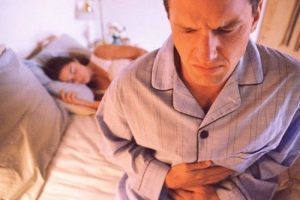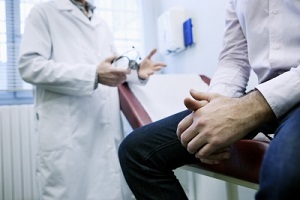
Inflammation of the prostate> is a disease that mainly affects men between the ages of twenty and fifty-five. The older a man is, the higher the risk of prostatitis.
In initial prostatitis, glandular functions are activated. Along with the appearance of inflammation, tissue regeneration also occurs.
Let's talk in more detail about the first signs of prostatitis in men and treatment.
How to recognize?
The occurrence of prostatitis is rarely recognized unambiguously, because it is sometimes asymptomatic, and the symptoms are individual for each patient and change over time.
These features include:
- A man has little difficulty urinating in the toilet. The gland gradually enlarges, the urethra narrows.
- The patient loses interest in sex. Difficulties with penis arousal increase when attempting sexual contact. Orgasm is achieved with difficulty or is weak or disappears completely.
- Burning in the urethra, itching in the perineum.
- I often want to urinate, but it comes out drop by drop.
- Seeds come out quickly during intercourse with minimal satisfaction.
- Increases general fatigue, depression, irritability, aggression, anxiety.
Man feels weak, his ability to work declines.
Noise in ears, ringing in head.
In the morning the person feels overwhelmed, loses initiative in life.
At the same time, prolonged erections and painful ejaculation sometimes occur spontaneously at night, which is not related to sex.
Observing these phenomena, the patient calms down, believing that he is well with potency, the problems are, in his opinion, related to the partner, their relationship. He is obsessed with depression, which worsens the development of the disease.
The first signs of prostatitis in a man
There are certain difficulties for the doctor and the patient to associate these symptoms with prostate diseases. They can be caused by stress (especially if there are reasons), conflict in personal life.
They are more likely to be associated with initial prostatitis if other symptoms follow:
- The patient feels pain in the groin, balls, perineum, lower back.
- With prostatitis, frequent urination, especially at night, this process is increasingly painful, the result of attempts to empty the bladder is less and less significant.
- The discharge of mucus from the urethra begins.
Symptoms of the first prostatitis slowly accumulate for a year, two, three. Worst of all, they have the character of a chain reaction: due to the increase of negative phenomena in the prostate, a man not only does not find pleasure, but is not able to satisfy his sexual partner either.
As a result, sexual intercourse is becoming less frequent, which causes stagnation of blood circulation in the pelvic area. Such stagnation is one of the causes of prostatitis.
Acute prostatitis differs in symptoms from chronic.
Its attributes:
- The temperature rises to 38-39 degrees for no apparent reason, with parenchymal prostatitis - up to 40 ° C.
- Dysuria reaches a point that it cannot urinate.
- Pain in the perineum becomes particularly intense.
- The patient shivers, feels nauseous before vomiting.
- I'm having trouble defecating.
What to do?
In chronic inflammation, the pain is mild, occurs and occasionally subsides in the perineum, is given in the lower back, pubic area. Excessive sweating, especially in the perineum.
Sexual dysfunction becomes permanent. Instead of urine for prostatitis in the morning, prostate secretion is secreted. The pain is mostly painful, spreading to the sacrum, suprapubic, rectum, penis.
The rate of development of sexual disorders depends on the degree of involvement in the process of pathology of seminal tubercle, seminal vesicles located next to the prostate. During the long phase of prostatitis in men, the intensity of sex hormone production decreases.
Young men in such cases often panic and are afraid of sexual intercourse. Fear of "embarrassment", inability to perform the necessary actions with a partner leads to neurosis, which further impairs sexual function.
Sexual dysfunction occurs when there is an excess of female hormones in a man's body, a lack of male hormones. They can also be the result of latent asymptomatic inflammation of the prostate, which has not been previously identified. Their development sometimes leads to male infertility.
If you find the first signs of prostatitis, what to do? When these signs appear, you must make an appointment with a urologist who will send the patient for tests based on their results, diagnose (or not) the disease and its type.
Identification of the ethology of prostatitis: bacterial or not, is also of the utmost importance for the choice of treatment method. For example, treating non-infectious prostatitis with antibiotics is not only useless, but also very harmful to the body.

First aid against prostatitis will be provided by a doctor. His goal is to restore normal urination with prostatitis. To do that, it is necessary to urgently reduce the size of the prostate, which compresses the urethral canal and does not allow urine to come out.
Relaxation of the glandular muscles can be achieved, for example, by massaging the prostate.
Prostate massage is a procedure that requires special qualifications of a masseur.
Execution by amateurs is burdened with serious complications, irreversible damage to internal organs.
A course of antibiotics, rectal suppositories, is prescribed for the treatment of bacterial prostatitis. It must be understood that harmful microorganisms cannot be exterminated by folk remedies, physical exercises, physical procedures and diet.
These methods will promote healing or will be needed during remission.
At the same time, for the treatment of bacterial prostatitis, their combination may be sufficient for a complete cure without "chemistry" or pharmacy drugs. It all depends on the stage of the disease, the individual characteristics of the patient's body, the experience of the doctor.
If the disease has progressed to a worsening phase, the infection is no longer present, the patient should be cured as soon as possible:
- start a regular sex life as soon as possible;
- remove bad habits. Eat a diet for patients with prostatitis;
- move more, play sports. Perform special exercises for men.
What other diseases are there with these symptoms?
The symptoms described do not necessarily indicate that the disease is prostatitis. They also accompany kidney disease, urethral infections, sexually transmitted diseases and other diseases.
Urethritis is the most common male disease. This is an infection in the urethra caused by bacteria, viruses, fungi. They become infected mainly through sexual contact.
Sometimes the infection waits for a suitable hour in the body and manifests when the immune system is weakened. The reasons for its reduction are the same as those that cause nonbacterial prostatitis: hypothermia, bad habits, chaotic sexual behavior, abuse of acidic, spicy, salty foods, stress, physical activity.
What exactly is inflamed: prostate or urethra (or both), tests will show, ultrasound examination. Based on that, the doctor will make a diagnosis.
Now you know about the first symptoms of prostatitis in men and its treatment. As with any disease, the sooner prostatitis is detected, the sooner you will cure it.
Ignoring the first signs of prostatitis and treatment brings frivolous patients to the operating table. It is better to take action in time.
























